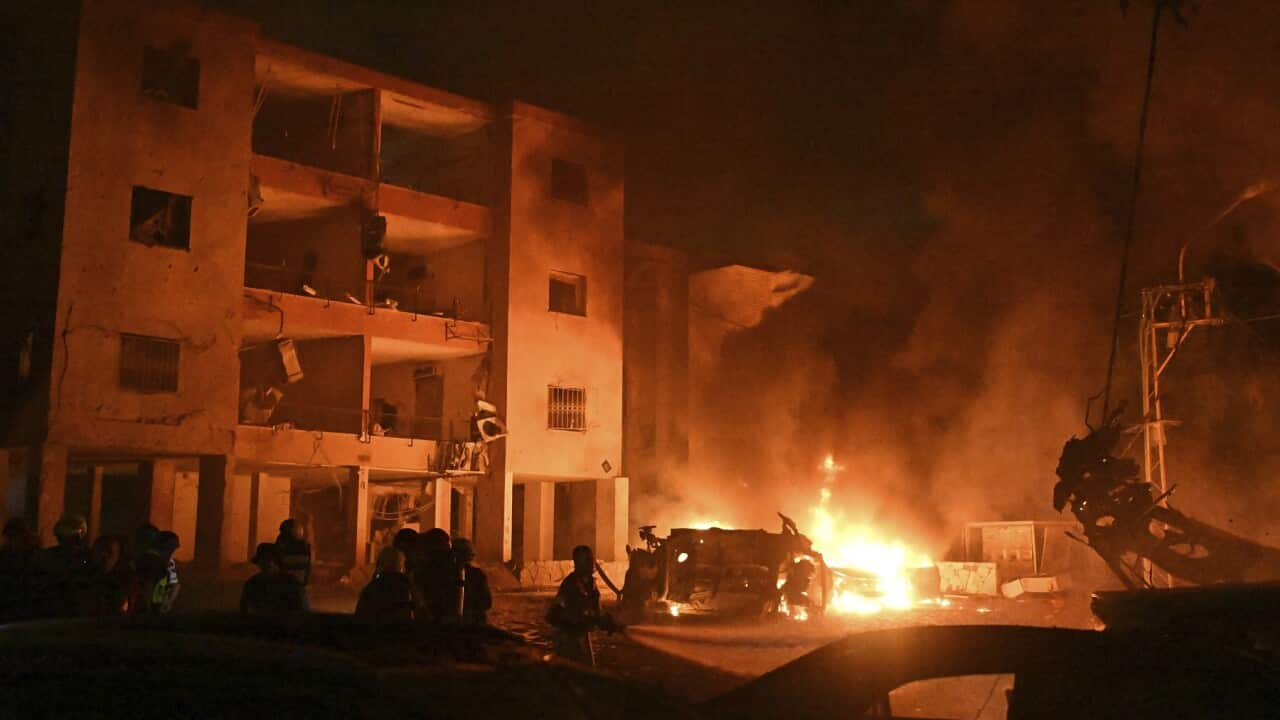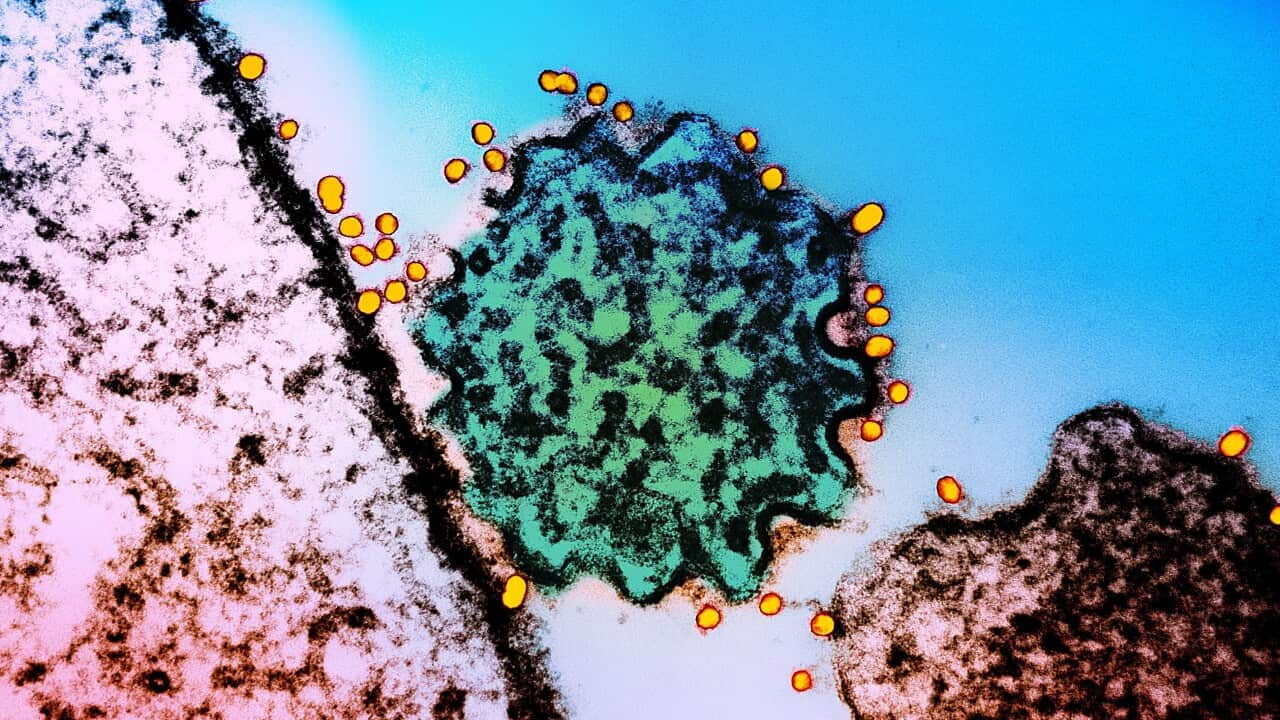Listen to Australian and world news, and follow trending topics with SBS News Podcasts.
TRANSCRIPT
Iran has struck targets across Israel in what some are calling the largest barrage of attacks since Israel struck Iran on Friday.
With hundreds killed and even more injured, Iran and Israel are entering their fourth day of major military strikes.
Over the weekend, at least 13 people were killed in Israel and 224 killed in Iran, with global leaders urging both countries to exercise restraint.
Provoked by a series of surprise Israeli strikes inside Iran, a war between the two is now escalating.
Iran's President Masoud Pezeshkian says that if Israel continues to strike, Iran's response will be more decisive and severe.
“Israel knows no boundaries. They intrude wherever they want with permission from America. In a conversation that Witkoff had with Dr. Araqchi, he said that ‘Israel cannot do anything without our permission.’ Meaning this is also carried out with America’s permission"
Israeli politicians have branded the initial strikes as 'pre-emptive', with claims Iran was actively pursuing nuclear weapons and posing an existential threat to Israel.
Israel says it hit more than 100 targets inside of Iran on Friday, with satellite imagery showing damage to Iran's Natanz nuclear site and a research centre in Isfahan.
Iran has responded by launching several barrages of missiles toward Israel, with a barrage today reportedly starting a fire in Haifa.
Responding to the news, the United States government has expressed support for the actions Israel is taking.
Israeli Prime Minister Benjamin Netanyahu says Israel has shared intelligence with the US.
"The intel that we got and shared with the United States was absolutely clear, was absolutely clear that they were working in a secret plan to weaponise the Uranium, they were marching very quickly, they would achieve a test device and possibly an initial device within months, and certainly in less than a year. That was the intel we shared with the United States "
Previously, the use of a pre-emptive strike to justify attacks was used when the United States invaded Iraq on the basis of claims it was developing weapons of mass destruction.
At least half a million people are estimated to have died in the war in Iraq, though no weapons of mass destruction were ever discovered.
Mohsen Rezaei is the Head of the Expediency Discernment Council in Iran; he says Iran is not pursuing a nuclear bomb.
“We are waiting for the reaction of Israel’s allies — whether they will step back or not. That is, the sooner the rational figures in America and Europe act, the better; their statesmen must withdraw their support from behind Israel. If this does not happen, and we witness the U.S. and other countries providing logistical support to Israel, their aircraft will enter the skies and collide with our missiles — whether they are British, French, or American planes. Therefore, the dimensions of the war may become more serious, and we are preparing ourselves for that. However, we always try not to be the initiator, but we will be the one to end it."
According to an official source, Iran has told mediators Qatar and Oman that it is not open to negotiating a ceasefire while it is under Israeli attack.
In Washington, two US officials have told media that US President Donald Trump vetoed an Israeli plan in recent days to kill Iran's Supreme Leader Ayatollah Ali Khamenei.
While both sides continue to strike, Mr Trump says that sometimes countries just have to fight it out.
"Well I hope there's going to be a deal. I think it's time for a deal and we'll see what happens but sometimes they have to fight it out but we're going to see what happens. I think there's a good chance there will be a deal."
Yemen’s Houthi militant group says it has targeted Israel with several ballistic missiles.
It marks the first time an ally of Iran has joined the fray since Israel launched attacks on Friday.
Houthi Military Spokesperson, Yahya Sarea, described the attack in a televised address.
"The missile force of the Yemeni Armed Forces carried out a military operation targeting sensitive Israeli enemy targets in the occupied area of Jaffa using a number of Palestine 2 hypersonic ballistic missiles at various times over the past 24 hours."
Iran, Israel, Iraq and Jordan have since closed their airspace to all flights.
Meanwhile, Group of Seven leaders are meeting in Canada where Iran and Israel are expected to dominate discussions.
Australian Prime Minister Albanese, who's been meeting with Canada's Mark Carney, says there is no escaping the need to discuss the escalation.
["We did discuss Israel and Iran. And both of us share a view, wanting to see a de-escalation of conflict, wanting to prioritise and diplomacy. I have expressed before our concern about Iran gaining the capacity of nuclear weapons as something that is a threat to security in the region."
In Gaza, Health authorities say Israeli forces have killed 59 Palestinians across Gaza, at least 17 of whom were trying to get food at aid sites operated by the controversial United States and Israeli-backed Gaza Humanitarian Foundation.
Critics continue to slam the aid system, with some describing the sites as human slaughterhouses.
Shortly before Israel struck Iran on Friday, electricity and internet was cut in Gaza.
UN spokesperson Farhan Haq says the power and internet outages mean communications are very limited with their staff on the ground.
"Our partners working on telecommunications say this is due to damage to the last fibre cable route serving central and southern Gaza, likely caused during heavy military activity. They warned that this is not a routine outage, but a total failure of Gaza's digital infrastructure. Lifelines to emergency services, humanitarian coordination and critical information for civilians have all been cut. There's a full internet blackout and mobile networks are barely functioning. In a context already limited by physical access restrictions and widespread damage, emergency services are cut off and civilians cannot access lifesaving support. You will have seen UNRWA's post earlier today saying they've lost contact with colleagues in Gaza - that's true for most agencies, we're largely cut off from our teams on the ground."













